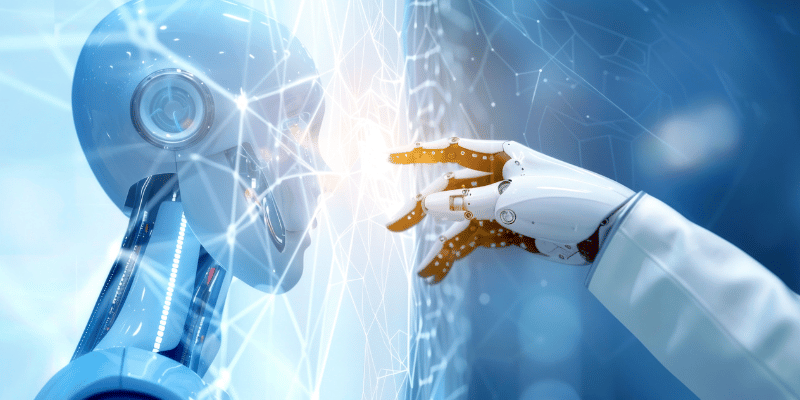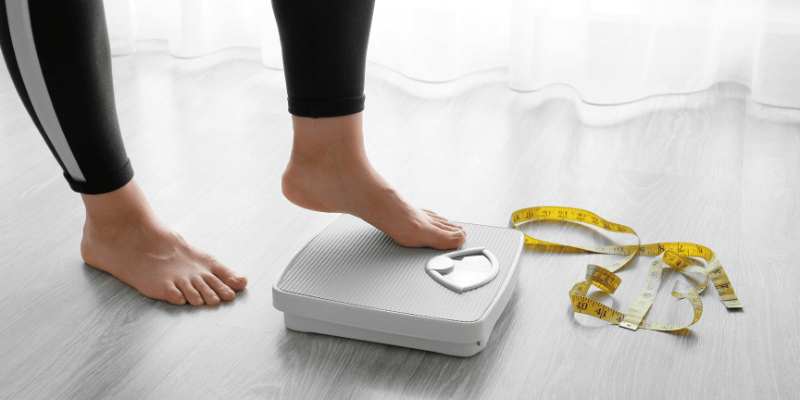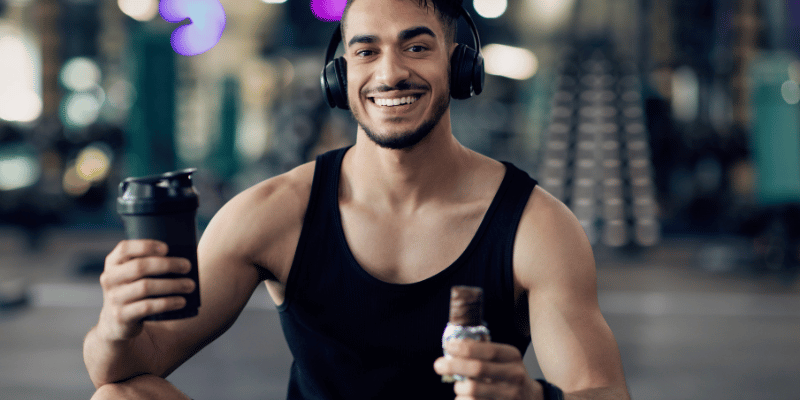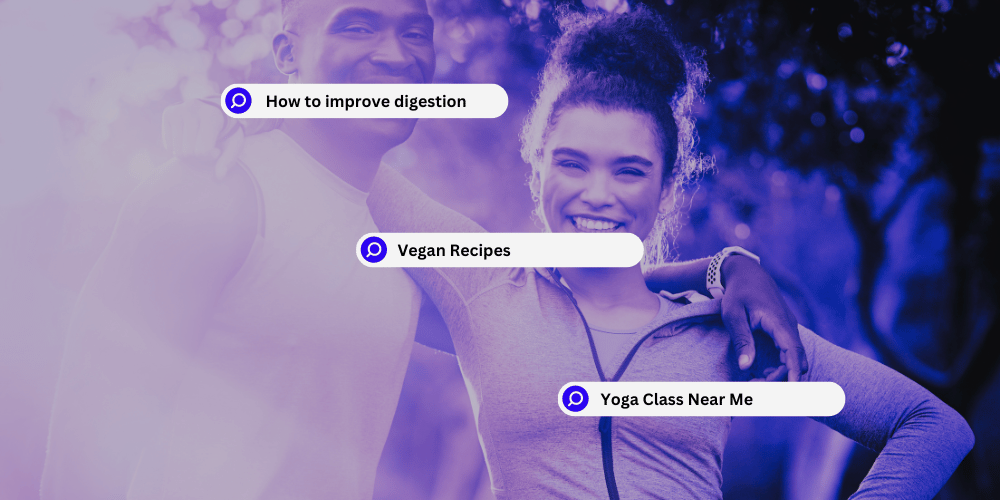Artificial Intelligence (AI) is everywhere you look. Nowhere is that more apparent than in the health and wellness industry. AI is rewriting the rules, making healthcare faster and smarter, fitness more personalised and nutrition advice easier to access.
However, what does the data say? By analysing search trends, we can uncover not only what’s trending right now, but also what’s shaping the future of AI in health and wellness.
AI in Healthcare
AI isn’t just sending waves across healthcare — it’s a tsunami of change. We’re talking faster diagnoses, improved treatments, and even increased public demand for virtual AI therapists for mental health. It’s no surprise that the AI-powered healthcare market is soaring, expected to reach a staggering $34.73 billion by 2031.
1) AI-powered diagnosis
Imagine a world were diseases like alzheimer’s, dementia, or even cancer can be diagnosed instantly. That world is already here. AI algorithms are scanning medical images, analysing patient data, and providing highly accurate results — sometimes even outperforming human doctors.
Personally, I find this AI takeover quite scary; many would probably rather place their trust in a doctor over a machine. However, the results are undeniable. Take the work from Warwick, Kings College London, and the NHS, where AI systems can analyse X-rays, instantly flagging problems with precision. This is an immense innovation that could save countless lives — but is the public on board?
Pros and Cons
Cutting costs: AI is not just more efficient — it’s saving a fortune. By prioritising the most critical cases, resources can go where they’re needed most.
Additionally, AI algorithms can cut the need for in-person visits, slashing both travel and energy costs — a great benefit during the pandemic, and in my view still a huge advantage today.
Is AI Biased?: While AI collects vast amounts of data, their systems are trained on data from a few American states. As a result, how can we accept AI in diagnosis if it’s not inclusive? Therefore, AI could really limit healthcare.
In Search Trends
Google searches for “AI in healthcare” and “AI diagnosis” have been climbing steadily over the past five years, reaching its peak as recently as January 2025. This tells us two things: AI-driven diagnoses are still new, and healthcare providers are still testing them.
Additionally, people are curious — they want to know if they can trust AI with their health. As AI-powered diagnoses become the new norm, the interest in this would be expected to skyrocket.

AI in Mental Health
The global economic toll of depression and anxiety is astounding — $1 trillion in loss of productivity each year. In contrast, demand for mental health services soaring (English services received a record 5 million referrals in 2023); AI offers a valuable solution.
Enter AI-powered apps like Youper and Wysa, offering on-demand therapy, mood tracking and crisis intervention. But do people really want help from a chatbot? In my view, AI mental health services could be useful, particularly to younger people growing up in a digital age. However, can chatbots really become that much of a trend that they can replace a professional?
The Pros and Cons
Breaking the stigma: Many avoid therapy due to embarrassment or fear of not being taken seriously. However, AI provides a safe, judgement-free zone where users can open up easily.
The Empathy Gap: Despite this, research warns users that without human connection, chatbots could struggle to provide the deep support people need, sometimes doing more harm than good.
In Search Trends
Since the pandemic, searches for “AI therapy” and “AI chatbots” have increased dramatically. Furthermore, the search for apps like Wysa have also climbed. As I see it, the link is clear —accessibility is vital. Because of the cost of living and overworked healthcare systems, AI-generated mental health support is becoming a necessity. I would predict that the more inaccessible traditional therapy becomes, the more search trends will continue to climb.

AI In Fitness
The global AI fitness industry is booming, projected to hit 138 billion USD by 2029. Since the 2020 pandemic, search interest in home-based fitness models has surged. AI is keeping the enthusiasm alive with apps that act like personal trainers — minus the hefty price tag.
AI Fitness Apps
Countless amounts of AI fitness apps are readily available to users. For instance, Alter.me and WHOOP are revolutionising workouts. Alter.me customises plans based on genetic testing, whilst WHOOP tracks recovery sleep and physical strain with error-free precision. It’s not difficult to wonder why searches for fitness apps are on the rise.
Pros and Cons
More accessible than ever: For many, personal trainers and premium gyms are too expensive or out of reach. The way I see it, workouts have become a tap away. Staying active with AI apps is easier and more convenient —especially in underserved areas.
What’s Missing? Nevertheless, is the convenience worth risking injury? Professionals don’t think so, emphasising the importance of human trainers to correct clients form during exercise.
In Search Trends
Despite being founded in 2012, WHOOP really took off in search trends from late 2019. This timing was no accident — it aligns perfectly with the beginning of the pandemic, a time when hybrid, at-home workouts were the new norm.
However, one thing is clear: fitness enthusiasts didn’t want to sacrifice personalisation. This is evident through the rising interest in “holistic coaching” and “AI workouts”, which can prioritise tailored workouts from the comfort of their homes.
From my point of view, users aren’t just looking for step counters anymore- — they want an entire health ecosystem at their fingertips.
Advanced Fitness Wearables
Fitness wearables have come a long way. In fact, as of 2020, one in five Americans are wearing smartwatches. Apple watches now remind you to breathe, stand and even warn you about dangerous noise levels. Additionally, STATSports’s GPS tracker analyses athletic performance at FIFA-approved accuracy.
From my perspective, AI fitness wearables are becoming an essential part of everyday life. As a result, search trends are skyrocketing.
Pros and Cons
Boosting Motivation: Importantly, AI apps use gamification, social challenges, and wearables to keep users engaged. In fact, 64% use game-like mechanics, and 78% use social influence to stay on track.
What about Privacy?: On the other hand, with so much personal data collected, security is a major concern. In 2021, 61 million fitness records were leaked, risking a huge data breach.
In Search Trends
Year after year, searches for “AI Watches” and “AI Apple Watch” continue to climb. From my point of view, consumers are no longer satisfied with basic tracking; they’re looking for something smarter, deeper insight that can seamlessly integrate into their daily lives.
Despite this, whilst not all watches are AI powered just yet; it’s only a matter of time until these AI becomes the standard for fitness wearables. As a result, this emerging trend suggests AI wearables will eventually become an essential to anyone interested in their health.

AI in Nutrition
Would you eat a meal made by an algorithm? Well, many people are beginning to. In fact, AI in —the nutrition industry is expected to become a billion-dollar industry by 2035. From the restaurants we dine in to the meals we make at home, AI will likely change that, emphasised by the growing search trends.
1) Personalised Diet Plans
Diet plans get a bad reputation — generic, impractical, and expensive. With apps analysing everything from jaw movements to metabolism, personalised nutrition is in demand. As a result, the global AI market for personalised nutrition grew from $2.96 billion in 2023 to $3.66 billion in 2024 alone!
Apps like NuMi, a popular nutrition app, offer real-time updates such as calorie tracking, dietary recommendations and alerts when habits turn unhealthy. It seems to me that the seamless automation of the app makes diet choices effortless.
Pros and Cons
More than just recipes: In addition to providing delicious meals, the results are undeniable. Results show that AI-driven plans can boost goal achievement by 20%. If you ask me, it is a no-brainer for those serious about losing weight to use AI recipe apps.
Here’s the Catch: Whilst AI nutrition apps might work for some, they have their drawbacks. What about the complicated psychological aspects of dieting? Surely more than downloading an AI diet app is needed to make lasting change.
In Search Trends
People are always on the lookout for the next big diet trend, and if search trends are an indication, AI could be the new thing. Search interest in “AI diet plan” has surged over the past 5 years, signalling a growing curiosity for automated, data-driven nutrition advice.
Of course, the practicality of AI-powered diets is up for debate. However, I believe that for those who cannot afford a human expert, AI diet plans could be hugely popular.

What Search Trends Are Telling us About AI
If search trends tell us anything, it’s this: AI isn’t a fad; it’s reshaping health and wellness. From every aspect, people are searching for more AI innovations than ever.
Why is that? Well, AI is solving real-life problems. AI is making personalised health and wellness more accessible, efficient, and most importantly, attainable for everyone, not just for the privileged few.
Moreover, the rising searches for “AI diagnosis”, “AI therapy”, and “AI diet plans” prove that people are curious, or maybe even sceptical — but definitely interested. And with traditional healthcare and wellness options becoming harder to access, I think that AI innovations aren’t just convenient, but a necessity.
Despite this, of course, not everybody is on board. There are worries about bias, privacy, and the loss of human touch. However, if the search trends are any indication, I would argue that AI’s role in our daily lives is only accelerating. In spite of its disadvantages, the AI-powered future of health and wellness is coming faster than we think.





